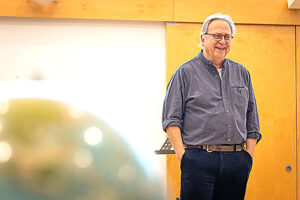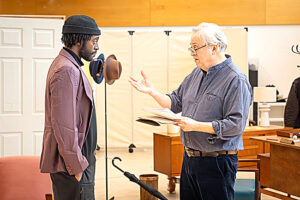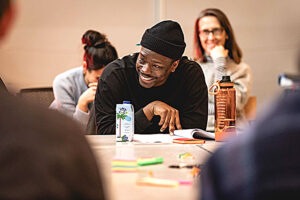
Stanley Townsend spoke to David Hennessy about his role in the West End transfer of the play Retrograde which opens at Apollo Theatre this month.
The Dublin actor Stanley Townsend plays Mr Parks in Retrograde which is about to come to the Apollo Theatre in London
Stanley Townsend is highly acclaimed for his powerful stage and screen performances.
With an extensive career in theatre, he has delivered standout roles in productions at the National Theatre, the Royal Court, in West End and at the The Gate and The Abbey Theatres in Dublin.
Recent television and film projects include Netflix’s Kaos, HBO’s The Regime, Blackshore and BBC’s Sherlock.
He is also a co-founder of Rough Magic Theatre Company.
Highlights from his extensive stage career include All About Eve with Gillian Anderson, Glengarry Glen Ross (The Playhouse, London), Girl From the North Country (Old Vic), King Lear, Gethsemane, Happy Now, Remember This, Guys and Dolls at the National Theatre, London; The Alice Trilogy, and The Nether (Royal Court, West End) alongside his Retrograde cast mate Ivanno Jeremiah.
His accolades include the Irish Times Best Actor Award for his performance in Conor McPherson’s Shining City and the Clarence Derwent Award for Best Supporting Actor (2010) for his performance in Phedre at the National Theatre in London.
Based on real life events, Retrograde is a gripping thriller about a career defining moment in life of Sidney Poitier: outstanding actor, trail blazer, activist, icon. The first black artist to win an Oscar for Best Actor.
Already a smash-hit at Kiln Theatre in Kilburn, the play by Ryan Calais Cameron (For Black Boys…) is transferring into the West End.
Ivanno Jeremiah will reprised his role as Hollywood icon Poitier, alongside Townsend as Mr Parks, and Oliver Johnstone as writer Bobby.
The production is directed by the Kiln Theatre’s Artistic Director Amit Sharma.
The story finds Sidney Poitier about to sign a career-defining Hollywood contract that could make him a star. But there’s a catch. Will he put his career before his principles? In a time of betrayals, will he name names? Will he sign his life away?
Retrograde follows Ryan’s smash West End hit For Black Boys Who Have Considered Suicide When the Hue Gets Too Heavy , which played the Apollo Theatre in 2023, and the Garrick Theatre in 2024.
The Irish World chatted to Stanley Townsend as he rehearses at The Kiln in Kilburn.

What attracted you to this powerful story?
“I suppose, honestly, what attracted me to it was I started reading the script and page three, I was hooked.
“It was just a completely rollercoaster read right through.
“That never happens with plays.
“Plays are hard to read, you know?
“This is easier because it’s three characters but it’s just electric.
“It’s like a thriller.
“You can’t put it down, so that’s got to be good. That’s attractive.
“The language then.
“I came over here, it must be nearly 30 years now, 26, 27 years ago.
“I came over a little earlier, doing plays but then I came over and I did Guys and Dolls in the National, Richard Ayer’s production.
“It was Damon Runyon that originated that with his short stories in the 20s.
“I’ve done a lot of Arthur Miller over the years, and I’ve done a lot of David Mamet.
“So I’ve done a lot of the American, to me, great writers of speech.
“And I was just so excited by what Ryan Calais Cameron has written.
“It’s amazing.
“It’s incredible stuff.
“It has such bite, vigour and he’s captured the period, the language, 1955 New York.
“This is greatness.”
Let’s talk about your character, Mr. Parks. If it is Poitier’s story, he’s very much the bad guy, is he not?
“That’s your opinion,” Stanley says with a smile: Jovial but quick to point out there is more nuance than our question suggests.
“Nobody looks at themselves in the mirror in the morning and says, ‘Oh, I’m a bad person’.
“You may think, ‘Oh, I’m going to be out for myself today’.
“So that’s where Larry is.
“Larry’s a pragmatist.
“He would call himself a pragmatist and a realist and a pursuer of the American Dream, the freedom of the individual to pursue any course they see fit.
“He follows an agenda that is kind of neocon and McCarthyism but he follows that agenda to look out for himself.
“So I suppose you could say he doesn’t have a great deal of principle or a great deal of ethics to him but he’s highly entertaining.
“He’s charismatic.
“If you go out with Larry Parks, you’re going to have a great night and I mean, a great night.
“So he’s a lot of fun to play.
“I may not be opening the fan mail on this one but it’s a lot of fun to play.
“I mustn’t think of him as a villain because otherwise he gets too emblematic.
“I must humanise him.
“I must carry all my humanity into the character, and get you to fall in love with him and then realise, ‘Oh no, no, no, this is wrong. I can’t go with this guy’.”
That’s where the ethics and the morals come into it. It is Sidney Poitier who has this dilemma, this ultimatum that the play centres around and the question is if he sticks to his principles or betrays them..
“I suppose it’s Faustian in its form.
“He’s placed in a position where everything is laid out.
“It’s the temptation.
“Everything is laid out for him and my job as Parks is to make that so attractive and so glistening and gleaming, and the alternative so awful that really, anyone faced with that choice would choose the gleaming, glistening one to look after their family, to look after their life, you know?
“Sidney is our protagonist.
“I suppose Larry would be the antagonist but we have a fantastically interesting character, played by Oliver John Stone, who’s the writer of the piece, who’s in to sign his contract but then just sticks around to make sure everything goes smoothly with Sidney because it’s the time of McCarthyism and the rise of the civil rights movement.
“He then eventually is put in a position, will he try and persuade Sidney and that’s a very interesting question that a lot of liberal America are being asked right now, so it rings that way as well.
“Of course the central argument is about Sidney and the black community and their civil rights struggle but there’s also that additional ring, you know?
“It’s an amazing piece of writing for an actor.
“You want to be involved in telling the stories that are progressive for the human project that you believe in.
“You want to entertain, thrill, stir, intellectually and emotionally.
“This does all of the above.”
And as you say there are timely lessons in the piece. As the playwright himself says although this is Sidney’s story, many face similar dilemmas to this day..
“Yeah, without naming names…
“If you don’t stand up to the bully, then the bully will just railroad you and dismiss you.
“If you become the ‘Yes, sir, three bags full, sir’, kind of person, you lose yourself actually, you don’t gain anything because you’ll have no respect from the bully.
“That’s the question really that’s being asked.
“Everyone’s being asked.
“Our European leaders are being asked but not just the leaders, every individual in the Western world.
“It’s particularly resonant for today, I believe.
“I’ve just researched the time, the pressures, the paranoia of the time, because everyone was naming names and rising. The idea that if you were good at your job protected you is gone and everyone’s watching their back.
“It’s an extraordinary time, 1955, in the entertainment industry in America was maybe like the civil war in Ireland.
“Everyone was betraying everyone and nobody trusted anyone and there were informers all over the place.
“It’s that kind of a world you’re living in, and yet there’s glamour so it’s a fantastic mixture.”

You said how much the script spoke to you when you first read it.
Were you already aware of Ryan prior to that because he certainly seems like he’s a star on the rise…
“There’s no question.
“No, I knew nothing about Ryan. Ignorant.
“I’d been in Ireland, really since COVID.
“We have a little house in the north west, north Leitrim.
“We love it there and we have a little flat here in London as well so we kind of went there for a couple of months when COVID hit, and we never really kind of got back.
“This is the first kind of big theatre job I’ve done in London since COVID so I’m back now and it’s quite a re-engagement.
“We were over doing film and telly and stuff like that but not for a big block of time.
“I think the last thing I did was All About Eve.
“A wonderful production by Ivo Van Hove, not without its challenges but a fantastic thing to be part of.
“And then I did two one man shows I did incantata.
“This was in Ireland, poems by Paul Muldoon, and also Solar Bones, a novel by Mike McCormack.
“So like a fool I did two one man shows, back to back, one a poem and one a novel and now I’m back doing plays and it’s a delight.
“This is five months, eight shows a week. London town.
“I tell you: When you walk up to the theatre and you see the play title up and your name, you really feel like you have a place in the city.
“It’s wonderful.”
Is there something special about the stage for you?
“Yeah, well, it’s the live event.
“The peril is great.
“It’s a much more social art.
“As a company of actors, you give and take and depend on each other in the live moment.
“You tell the story live, the actor is the centre on stage whereas the camera is centre on set socially and you have much more control.
“You’re like a water colourist as opposed to a mosaic maker, so you go on and you do the whole thing. You tell the whole story in the night.
“I love film and television but it’s very different.
“Theatre is, for the player, for the actor, primarily aural so it’s to do with the voice and I have a good voice so I’ve always felt at home in the theatre.
“And I started in the theatre.
“I love it.
“And also you get to speak to people afterwards and talk about how they’ve found it.
“It’s always good, I think, to talk to folk after they’ve seen the show and see what they think, see what they get out of it, because you learn and you help propagate the debate that you’re hoping to start.”

When did you know you wanted to act?
“Well, I suppose I was always kind of a clown as a kid.
“I used to make submarine noises at the back of class, stupid stuff like that.
“Any school concerts, I’d do impersonations of teachers so I was always kind of a performer.
“And then a great English teacher brought me into the theatre and we did school plays together.
“I suppose looking back, I didn’t realise this at the time, but it’s being the centre of attention without the responsibility of what’s being said.
“That is what drew me to it.
“I loved, and I love the entertainment and clowning element of it.
“My father used to say to me, ‘I think you are best when you’re doing the comedy’.”
Was it natural to make the move to London at some point then?
“Well I started out in Dublin the first well 10, 15 years.
“I was in Trinity and a group came out of Trinity and started a theatre company called Rough Magic Theatre Company, 40 years ago, last year, I think, and still going strong.
“And we were a cooperative theatre company going to change the world, and that’s what we did.
“And so I did about seven years with them and then started to diversify into the Abbey, the Gate, there wasn’t much film work around in those years, little bits and bobs that I picked up small bits in.
“And then I wanted to just work with different people really so it was either New York or London.
“London was handier.
“I could kind of go over and get a job in England and come back to Dublin. Go over, get a job in England, come back.
“So I went up to Nottingham and did a job and then I did a job at the Bush Theatre in London, and then I got to play big Jule in Guys and Dolls in the National and that was six month contract so that kind of brought me over.”

Did you feel the presence of a strong Irish community here when you landed?
“Absolutely, yeah.
“This (Kiln Theatre) used to be called The Tricycle then and you knew if you went up The Kings of Kilburn High Road might be playing.
“It was a place to go to meet and greet.
“I loved the mixture of folk when I came to London so we ended up Waterloo initially and then we ended up getting a little flat in Kennington, and we’re there still.”
I wanted to bring up a recent piece of work of yours, The Teacher.
Written and directed by British- Palestinian film maker Farah Nabulsi and also starring Imogen Poots, the film was shot in the West Bank and released last year.
“Yeah, it was a great experience. Shocking but a great experience.
“The Palestinian people were so welcoming.
“They’re nearly as pathologically welcoming as the Irish.
“They want to feed you, they want to put you up. They want to look after you.
“It was a great privilege.
“Farah Nabulsi- an inspirational, visionary auteur- wrote, directed and produced this marvellous film.
“We went out and they brought myself and my wife out for four weeks to the West Bank.
“The history of the place.
“We witnessed the horrors.
“We saw repression.
“And also we did some tourist things and saw some amazing sites.
“We engaged with the people and told the story.
“It’s an important film at the moment because it gives context.
“It doesn’t deal with the present manifestation of the conflict but it does help to give a context and it’s very balanced piece of filmmaking by a really brilliant Palestinian filmmaker.”

Was it not scary to go out there though?
“I was apprehensive but I suppose it’s such an opportunity.
“And once again, it was a great script, and once again, it had real purpose so I just went ‘yes’ and followed it.
“There were some occasions we got stopped.
“It was extraordinary, these youthful members of the Israeli Defense Force stopping us and really didn’t regard us as equals at all.
“That was very shocking and difficult.
“There’s two types of reg on your car in the West Bank.
“One is Israeli and one is Palestinian.
“If you’re Israeli, you get waved through.
“If you’re Palestinian, you join the queue.
“The West Bank is zoned A, B and C, maybe more now.
“There are roads that are zoned so only Israelis can use those roads.
“These are massive, new, modern roads right through the West Bank.
“The water gets turned off in the Palestinian houses and the Israeli houses, the water supply is always there. so there’s lots of little things like that to really hit you and you feel it.
“Anyway, it was a marvelous experience.
“I don’t want to get too political on it.
“See the movie is what I want to say.
“It’s a deeply moving, engaging, wonderful film.”
With Ryan and this play and Farah with that film, it seems they are two important voices and it’s great they are being heard..
“Absolutely and what Ryan has managed to do is be highly entertaining, funny, compelling and stirring both intellectually and emotionally.
“That’s what you want theatre to do.
“I’m learning all the time.
“Every day is a school day.”
Retrograde is running at the Apollo Theatre in London from 8 March to 14 June 2025.
For more information and to book, click here.



